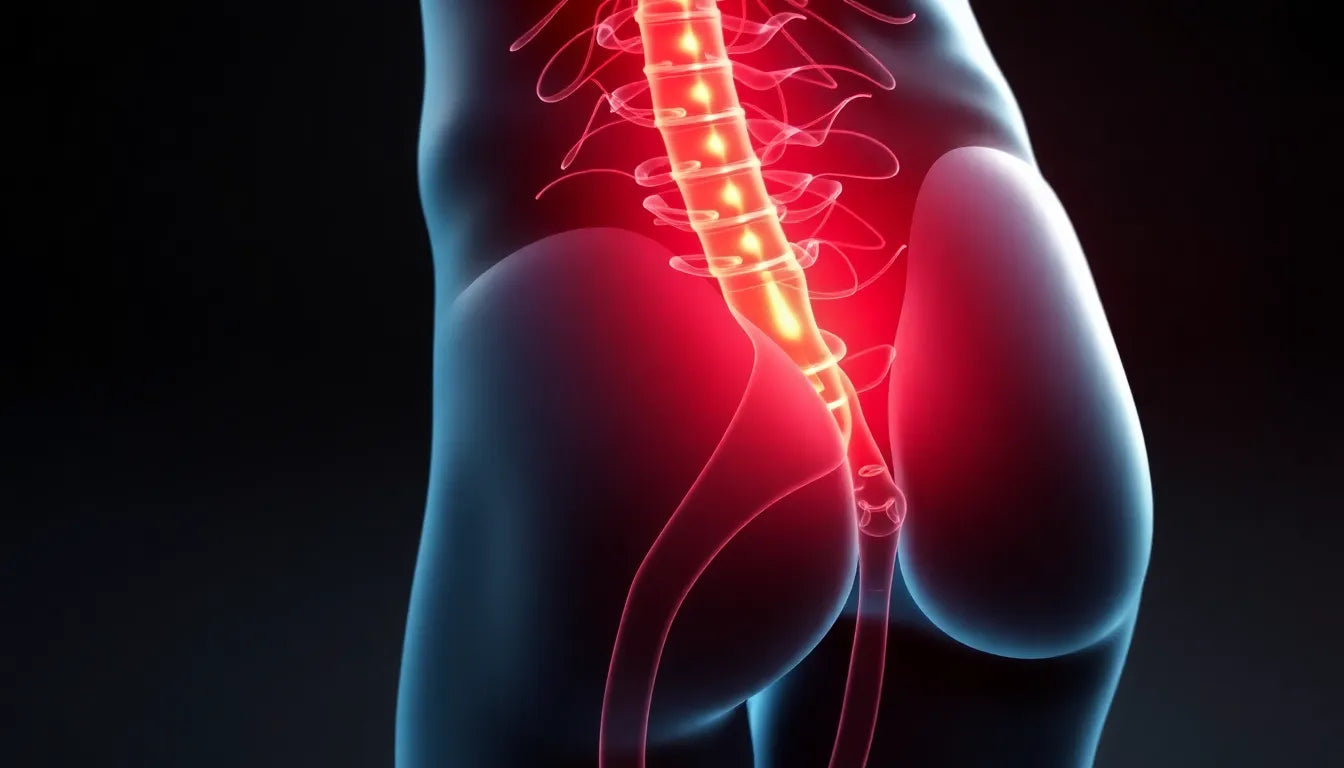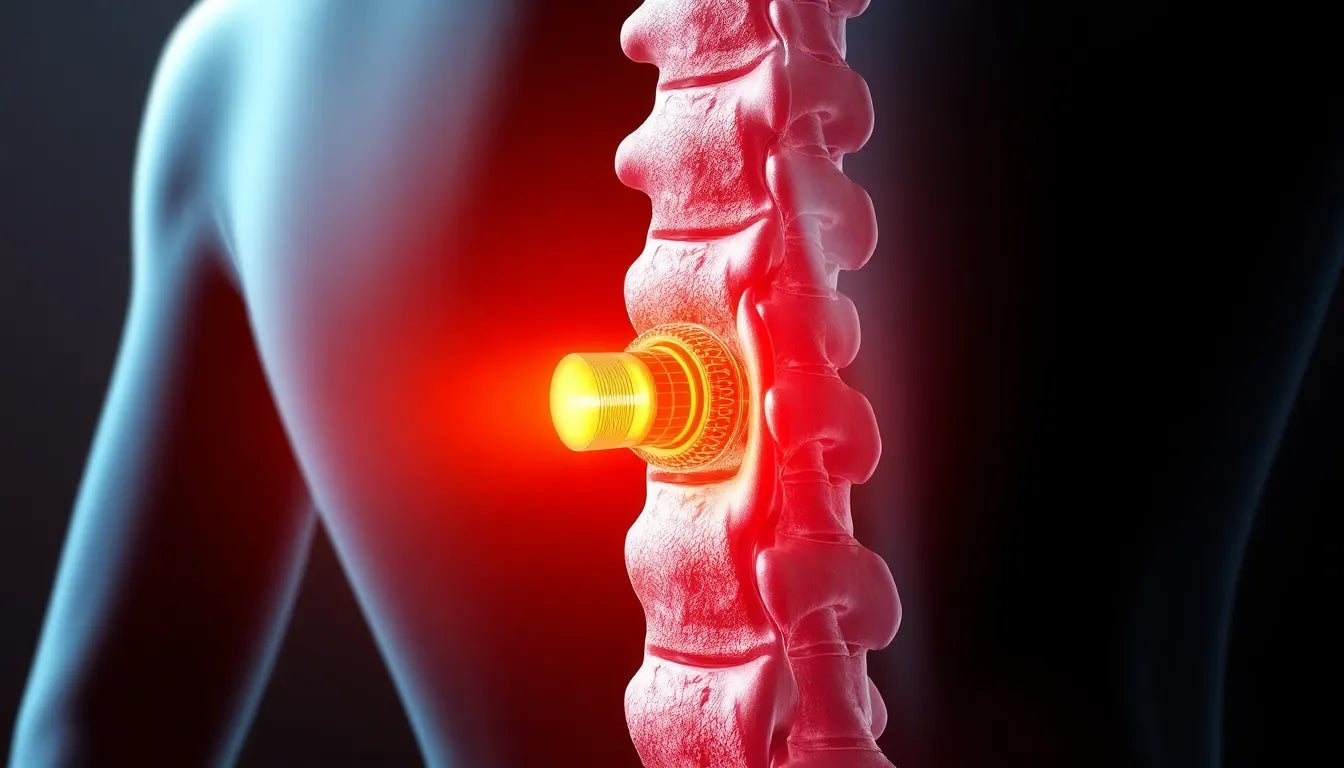Living with a herniated disc is a reality for many, yet the silent struggle often goes unnoticed. It's estimated that a significant portion of the population may be enduring the discomfort of a herniated disc without realizing the potential long-term consequences. This condition, characterized by the displacement of the soft inner gel of the disc through a tear in its outer layer, can manifest in various symptoms, including back pain, numbness, and tingling sensations. Many individuals might dismiss these signs as minor issues or attribute them to aging, leading to a delay in seeking treatment.
Common misconceptions about herniated discs
One of the primary reasons people delay seeking medical advice for a herniated disc is due to common misconceptions. Many believe that the pain is a natural part of getting older or the result of a minor injury that will heal on its own. This underestimation of the condition's severity can lead to prolonged suffering and potential complications. It's crucial to understand that while some cases may resolve over time, ignoring persistent symptoms could result in more serious health issues.
Recognizing the long-term implications of untreated herniated discs is essential. Prolonged pressure on the spinal nerves can lead to chronic pain, nerve damage, and even loss of mobility. These outcomes not only affect physical health but can significantly impact one's quality of life and daily functioning. Therefore, acknowledging the seriousness of a herniated disc and seeking timely medical intervention is vital.
The objective of this post
This post aims to shed light on the hidden dangers of delaying treatment for a herniated disc. By exploring medical insights and expert opinions, we will delve into the potential long-term effects and emphasize the importance of early intervention. Understanding these risks can empower individuals to make informed decisions about their health and seek appropriate care before complications arise.
In the sections that follow, we'll discuss the various consequences of living with an untreated herniated disc, including chronic pain, nerve damage, muscle weakness, and more. By providing a comprehensive overview, we hope to highlight the critical need for awareness and proactive management of this common yet often overlooked condition.
Chronic pain and discomfort: the lingering effects
When a herniated disc remains untreated, chronic pain often becomes a constant companion, disrupting daily life and diminishing overall well-being. This persistent pain is not just a physical burden; it can also lead to emotional and psychological stress, impacting mental health and quality of life. The discomfort can make simple tasks, like sitting, standing, or walking, increasingly difficult, forcing individuals to alter their routines and limit activities they once enjoyed.
While short-term pain management strategies, such as over-the-counter medications and physical therapy, may provide temporary relief, they often fall short in addressing the root cause of the pain. In contrast, long-term strategies, including surgical interventions or specialized treatments, aim to correct the underlying issue, offering more sustainable relief. The table below highlights the differences between these approaches:
| Short-term Pain Management | Long-term Pain Management |
|---|---|
| Over-the-counter pain relievers | Surgical intervention |
| Physical therapy | Chiropractic care |
| Heat and cold therapy | Customized exercise programs |
Nerve damage: a silent threat
One of the most concerning consequences of an untreated herniated disc is the risk of nerve damage. When the displaced disc material compresses nearby nerves, it can lead to a range of symptoms, from tingling and numbness to severe pain and muscle weakness. Over time, this compression can cause irreversible damage, potentially resulting in permanent loss of sensation or motor function.
The diagram below illustrates how a herniated disc affects the nerves:

Understanding this mechanism underscores the importance of early intervention. By addressing the issue promptly, it's possible to alleviate pressure on the nerves and prevent long-term complications.
Muscle weakness and atrophy: the gradual decline
Prolonged nerve compression from a herniated disc can also lead to muscle weakness and atrophy. As the affected nerves struggle to transmit signals effectively, the muscles they control may weaken and waste away over time. This progression can make everyday activities, such as lifting objects or climbing stairs, increasingly challenging.
Muscle atrophy not only affects physical strength but can also lead to a visible reduction in muscle mass, further impacting mobility and function. Recognizing these signs early and seeking appropriate treatment is crucial to maintaining muscle health and preventing further decline.
Loss of mobility and function: the impact on independence
As the condition advances, loss of mobility becomes a significant concern. This limitation can severely restrict physical activity and independence, affecting everything from occupational tasks to recreational pursuits. The inability to move freely can also lead to a sedentary lifestyle, increasing the risk of other health issues, such as obesity and cardiovascular disease.
Consider the story of John, a 55-year-old who delayed treatment for his herniated disc. Over time, his mobility decreased, leading to early retirement and a diminished quality of life. His experience highlights the real-life implications of untreated herniated discs, emphasizing the need for timely medical intervention.
Degenerative changes: accelerating the aging process
Untreated herniated discs can also accelerate degenerative changes in the spine. The continuous stress and inflammation can hasten the deterioration of spinal structures, leading to conditions like spinal stenosis or osteoarthritis. These degenerative changes not only exacerbate pain but can also complicate future treatment options.
Experts like Dr. Sarah Thompson, a renowned spine specialist, stress the importance of early intervention. "Addressing a herniated disc promptly can significantly slow down or even prevent degenerative changes, preserving spinal health and function," she advises.
In summary, the hidden dangers of delaying treatment for a herniated disc are profound. From chronic pain and nerve damage to muscle atrophy and degenerative changes, the consequences can be severe and far-reaching. By understanding these risks and seeking timely care, individuals can protect their health and maintain a better quality of life.
Ergonomic solutions and self-care for herniated discs
Managing a herniated disc effectively often involves integrating ergonomic solutions and self-care practices into daily routines. Ergonomics focuses on designing environments that support the body’s natural posture and reduce strain. For those dealing with herniated discs, using ergonomic chairs, desks, and supportive cushions can help maintain proper alignment and alleviate pressure on the spine. Additionally, ensuring that workstations are set up to promote good posture can prevent further aggravation of symptoms.
Self-care practices are equally important in managing discomfort. Gentle stretching exercises, as recommended by healthcare professionals, can help maintain flexibility and reduce tension around the affected area. Applying heat or cold packs can also provide temporary relief from pain and inflammation. These interventions, while not substitutes for professional medical treatment, can be beneficial in managing symptoms at home and improving overall comfort.
Work implications: navigating herniated discs in the workplace
Chronic issues from a herniated disc can significantly affect work performance and productivity. Pain and discomfort might lead to increased absenteeism or difficulty concentrating on tasks. It's crucial for individuals to communicate their needs to employers and seek necessary accommodations, such as ergonomic equipment or modified duties, to maintain work performance.
When discussing these issues with employers, it's helpful to provide documentation from healthcare providers outlining specific needs. Employers are often willing to make reasonable accommodations, such as allowing more frequent breaks or providing sit-stand desks, to support employees' health and productivity.
Conclusion: the importance of timely action
In conclusion, the hidden dangers of delaying treatment for a herniated disc are significant and multifaceted. From chronic pain and nerve damage to muscle weakness and degenerative changes, the potential consequences can severely impact quality of life. By understanding these risks and taking timely action, individuals can protect their health and maintain their independence.
Consulting with healthcare professionals is crucial for a personalized treatment plan that addresses the specific needs of each individual. Early intervention not only helps alleviate current symptoms but also prevents future complications, ensuring a better quality of life.
Frequently Asked Questions
What are the first signs of a herniated disc?
Common symptoms include back pain, numbness, and tingling in limbs. These symptoms can vary in intensity and may be mistaken for other conditions.
Can a herniated disc heal on its own?
Some cases may improve with rest and conservative treatments, but professional evaluation is crucial to determine the appropriate course of action.
What are the risks of ignoring a herniated disc?
Ignoring symptoms can lead to chronic pain, nerve damage, and loss of mobility. These issues can significantly affect one's quality of life and may require more invasive treatments if left unaddressed.
How can ergonomic products help with a herniated disc?
Ergonomic aids can provide support, improve posture, and reduce strain on the spine, helping to alleviate discomfort and prevent further injury.
When should I seek medical attention for a herniated disc?
If pain persists beyond a few weeks or worsens, it's important to consult a healthcare provider to evaluate the condition and discuss treatment options.
Sources
- Lanman, T. (2023). "5 Long-Term Effects of a Herniated Disc: Why Treatment Matters." Spine.md.
- "The Long Term Effects of Ignoring a Herniated Disc." Cure Pain.
- "Herniated disk - Symptoms and causes." Mayo Clinic.
- "Disc Herniation." StatPearls. NCBI Bookshelf.
- "Herniated Disc Still Hurts After a Year." Pro Health Clinic.
- "Long-Term Effects and Prognosis for Back and Neck Herniated Disc." Dr. Kevin Pauza.


















